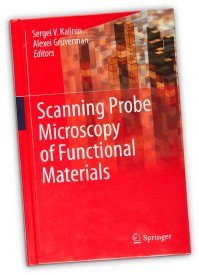The new book, "Scanning Probe Microscopy of Functional Materials," edited by Dr. Sergei Kalinin of the Oak Ridge National Laboratory and Alexei Gruverman of the University of Nebraska, describes cutting-edge nanoscale imaging and spectroscopy advances in the field of atomic force/scanning probe microscopy.
The volume includes 18 articles by leading university, U.S. government, and industry researchers, including three authored or co-authored by Dr. Roger Proksch of Asylum Research, the technology leader in scanning probe/atomic force microscopy (AFM/SPM). Recent research has produced remarkable progress in the development of scanning probe microscopy and this new book is expected to become a seminal work in the field.

Commented author and President of Asylum Research, Roger Proksch, "This new book includes papers on a broad range of new techniques that extend the functionality of SPMs and is an excellent overview for readers interested in quickly getting up to speed on the latest developments. I am delighted to be an author on three of the papers, which illustrate some of the exciting new capabilities we have incorporated into our MFP-3D and Cypher AFMs, including Band Excitation, Dual AC Resonance Tracking (DART), Piezoresponse Force Microscopy (PFM), and Ztherm modulated thermal analysis."
"SPM has truly become a key characterization tool, not just for selected scientific disciplines, but for the field of nanoscience and technology in general," notes Alexei Gruverman, co-editor of the book and Associate Professor at the University of Nebraska-Lincoln. "This book presents a snapshot of the most advanced modes of this continuously evolving technique describing nanoscale studies of a variety of functional materials such as complex oxides, biopolymers, and semiconductors."
"One of the central tasks of this book is to provide an overview of recent developments in emerging fields of SPM, such as nanoscale thermal analysis, band excitation, chemical imaging using mass-spectrometric detection, as well as exotic combinations of SPM and focused X-ray methods, to name a few," added Sergei Kalinin, co-editor of the book and Senior Staff Member at Oak Ridge Center for Nanophase materials. "The unique aspect of this book is a strong representation of the leading SPM companies with their cutting-edge research and SPM developments that are now becoming available in academic, government, and industrial labs as well as techniques just emerging in leading research labs worldwide."